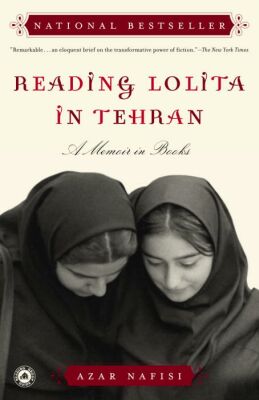
 April 2006
April 2006
Reading Lolita in Tehran: A Memoir in Books
by Azar Nafisi
Summary
Every Thursday morning for two years in the Islamic Republic of Iran, a bold and inspired teacher named Azar Nafisi secretly gathered seven of her most committed female students to read forbidden Western classics. As Islamic morality squads staged arbitrary raids in Tehran, fundamentalists seized hold of the universities, and a blind censor stifled artistic expression, the girls in Azar Nafisi’s living room risked removing their veils and immersed themselves in the worlds of Jane Austen, F. Scott Fitzgerald, Henry James, and Vladimir Nabokov. In this extraordinary memoir, their stories become intertwined with the ones they are reading. Reading Lolita in Tehran is a remarkable exploration of resilience in the face of tyranny and a celebration of the liberating power of literature.
From the Publisher
"We all have dreams - things we fantasize about doing and generally never get around to. This is the story of Azar Nafisi's dream and of the nightmare that made it come true." "For two years before she left Iran in 1997, Nafisi gathered seven young women at her house every Thursday morning to read and discuss forbidden works of Western literature. They were all former students whom she had taught at university. Some came from conservative and religious families, others were progressive and secular; several had spent time in jail. They were shy and uncomfortable at first, unaccustomed to being asked to speak their minds, but soon they began to open up and to speak more freely, not only about the novels they were reading but also about themselves, their dreams and disappointments. Their stories intertwined with those they were reading - Pride and Prejudice, Washington Square, Daisy Miller and Lolita - their Lolita, as they imagined her in Tehran." Nafisi's account flashes back to the early days of the revolution, when she first started teaching at the University of Tehran amid the swirl of protests and demonstrations. In those frenetic days, the students took control of the university, expelled faculty members and purged the curriculum. When a radical Islamist in Nafisi's class questioned her decision to teach The Great Gatsby, which he saw as an immoral work that preached falsehoods of "the Great Satan," she decided to let him put Gatsby on trial and stood as the sole witness for the defense.
About the Author
Azar Nafisi is a professor at Johns Hopkins University. She won a fellowship from Oxford and taught English literature at the University of Tehran, the Free Islamic University and Allameh Tabatabai University in Iran. She was expelled from the University of Tehran for refusing to wear the veil and left Iran for America in 1997. She has written for The New York Times, The Washington Post, The Wall Street Journal and The New Republic, and is the author of Anti-Terra: A Critical Study of Vladimir Nabokov's Novels. She lives in Washington, D.C., with her husband and two children.
